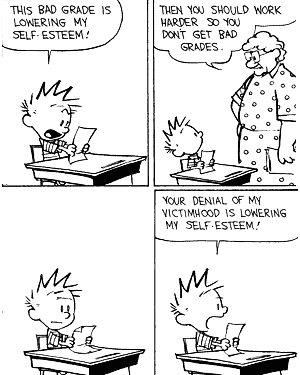Self-Esteem vs. Self-Respect
Theodore Dalrymple (not his real name) is one of my favourite writers. Utterly rational and fascinating on his recurring themes of ignorance, poverty and so on, he shows without telling and sermonises without preaching, allowing readers to understand what he's trying to say rather than being bombastic and repetitive. Here's the first half of a piece he wrote for In Character. Read the full thing here, it's good.
With the coyness of someone revealing a bizarre sexual taste, my patients would often say to me, "Doctor, I think I'm suffering from low self-esteem." This, they believed, was at the root of their problem, whatever it was, for there is hardly any undesirable behavior or experience that has not been attributed, in the press and on the air, in books and in private conversations, to low self-esteem, from eating too much to mass murder.
Self-esteem is, of course, a term in the modern lexicon of psychobabble, and psychobabble is itself the verbal expression of self-absorption without self-examination. The former is a pleasurable vice, the latter a painful discipline. An accomplished psychobabbler can talk for hours about himself without revealing anything.
Insofar as self-esteem has a meaning, it is the appreciation of one's own worth and importance. That it is a concept of some cultural resonance is demonstrated by the fact that an Internet search I conducted brought up 14,500,000 sites, only slightly fewer than the U.S. Constitution and four times as many as "fortitude."
When people speak of their low self-esteem, they imply two things: first, that it is a physiological fact, rather like low hemoglobin, and second, that they have a right to more of it. What they seek, if you like, is a transfusion of self-esteem, given (curiously enough) by others; and once they have it, the quality of their lives will improve as the night succeeds the day. For the record, I never had a patient who complained of having too much self-esteem, and who therefore asked for a reduction. Self-esteem, it appears, is like money or health: you can't have too much of it.
Self-esteemists, if I may so call those who are concerned with the levels of their own self-esteem, believe that it is something to which they have a right. If they don't have self-esteem in sufficient quantity to bring about a perfectly happy life, their fundamental rights are being violated. They feel aggrieved and let down by others rather than by themselves; they ascribe their lack of rightful self-esteem to the carping, and unjustified, criticism of parents, teachers, spouses, and colleagues.
The twin qualities leading to self-esteem are (an allegedly) just appreciation of one's own importance and of one's own worth. Neither importance nor worth, however, are qualities to be found in nature without an appraising mind; it is the appraising mind that confers them upon their object.
Read the full article here.

